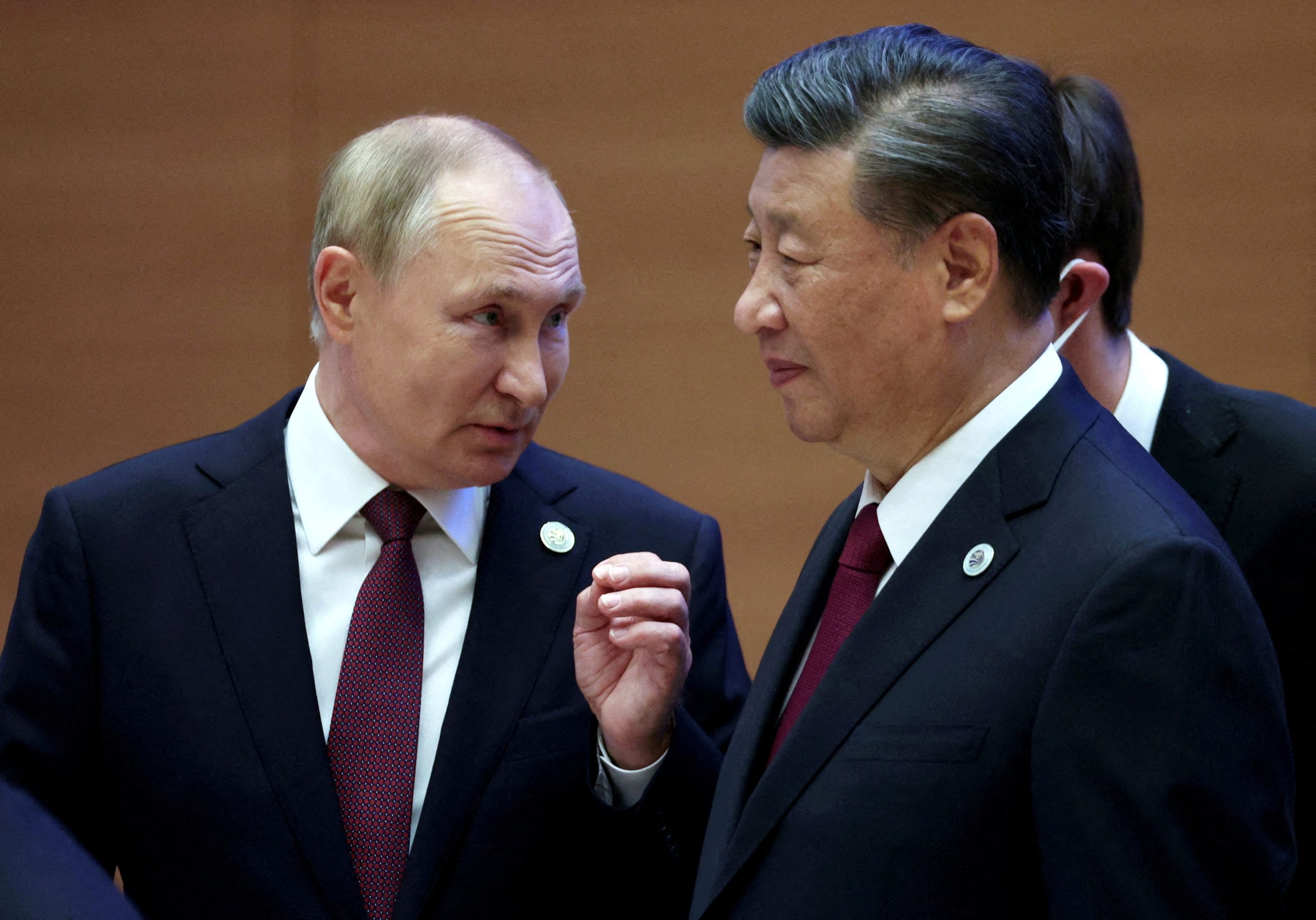
Chris Lange, FISM News
[elfsight_social_share_buttons id=”1″]
Russia’s suspension of its last remaining nuclear weapons treaty with the U.S. has heightened fears of a third world war amid reports that China is considering sending weapons and ammunition to Moscow in support of its war on Ukraine.
Ukrainian President Volodymyr Zelenskyy on Monday warned China against supporting Russia in an interview published by German newspaper Die Welt on Monday, saying that doing so would threaten to bring about World War 3.
Zelenskyy said that he hoped that China would instead choose to support Ukraine, though he added: “At the moment … I don’t think it’s possible.” The Ukrainian leader called on Beijing to make a “pragmatic assessment” of the situation.
Putin’s announcement on Tuesday that he had suspended the New START nuclear arms treaty with the U.S. has blighted Washington’s hopes to bring Beijing to the table to discuss its acceleration of nuclear arms programs at a time when China and Russia’s “no limits” partnership appears to be growing stronger.
The Wall Street Journal reported on Tuesday that Chinese President Xi Jinping will visit Moscow for a summit with Putin in the coming months, citing sources familiar with the matter.
While a specific date for the summit has not been finalized, sources said that Xi’s visit may take place in April or early May as Russia commemorates its World War 2 victory over Germany.
Despite heightened tensions over China’s role in the conflict, Reuters reported that Xi aims to push for multi-party talks on peace in Ukraine and call for assurances that nuclear weapons won’t be used.
China’s top diplomat Wang Yi arrived in Moscow on Tuesday to reiterate this position, according to the news service.
Regional diplomats and security analysts had been holding out hope that Beijing could be persuaded to join talks between Moscow and the U.S. to extend the New START treaty amid fears over China’s rapid military modernization.
“Compared to traditional Russian-U.S. exchanges, China is a black box – but one getting bigger every year,” an Asian security diplomat told Reuters on Wednesday on condition of anonymity.
“Putin’s suspension may have set us further back in terms of getting China to step up to the transparency table. There is so much we need to know about its policies and intentions.”
Tong Zhao, a U.S.-based nuclear expert at the Carnegie Endowment for International Peace, said that Putin’s move limits the prospects of U.S.-China nuclear cooperation.
“This is only going to make China even less interested in pursuing cooperative nuclear security with the United States,” Zhao told Reuters.
The Pentagon’s annual China report released last November noted Beijing at that time had a stockpile of more than 400 warheads and estimated that it will likely field 1,500 nuclear warheads and advanced missiles by 2035, the year Xi said he expects his military to be fully modernized.
BIDEN SAYS WAR IS PUTIN’S CHOICE
President Biden warned Russian President Vladimir Putin on Tuesday that “NATO will not be divided, and we will not tire” and threatened to ramp up sanctions in a speech delivered in Warsaw Tuesday.
On the heels of his surprise visit to Kyiv the previous day, Biden said that the U.S. and Europe “do not seek to control or destroy Russia,” citing remarks made by Putin.
“Putin is confronted with something today that he didn’t think was possible a year ago — the democracies around the world have grown stronger, not weaker; but the autocrats around the world have grown weaker, not stronger,” Biden said, per a Fox News report.
“One year into this war, Putin no longer doubts the strength of our coalition, but he still doubts our conviction. He doubts our staying power. He doubts our continued support for Ukraine. He doubts they can remain unified,” Biden said. “But there should be no doubt — our support for Ukraine will not waiver. “
“Every day the war continues, this is his choice,” Biden said of Putin. “He could end the war with a word. It’s simple: If Russia stopped invading Ukraine, it would end the war.”
Biden also met with Moldovan President Maia Sandu in Warsaw on Tuesday, who recently accused Russia of attempting a coup on her government. According to a White House readout of the meeting, Biden “reaffirmed strong U.S. support for Moldova’s sovereignty and territorial integrity” and “highlighted ongoing U.S. assistance to help Moldova strengthen its political and economic resilience, including its democratic reform agenda and energy security, and to address the effects of Russia’s war against Ukraine.”
The president is scheduled to meet with Eastern Flank NATO leaders in Poland today.
UN HUMAN RIGHTS COUNCIL DOCUMENTED NEARLY 19K CIVILIAN DEATHS SINCE INVASION
Russia continued to make “incremental” tactical advancements around the embattled Donetsk city of Bakhmut, the Institute for the Study of War said in its latest assessment of the war on Tuesday.
The Washington D.C.-based think tank noted that Russia continued “ground attacks” in nearby Avdiika and had made “marginal advances near Novomykhailivka, just south of Donetsk City.”
Meanwhile, the U.K.’s Defense Ministry reported that, as of Feb. 13, the United Nations Office of the High Commissioner for Human Rights (OHCHR) had documented 18,955 civilian casualties since the invasion, though the OHCHR believes the “actual figures are considerably higher.”
